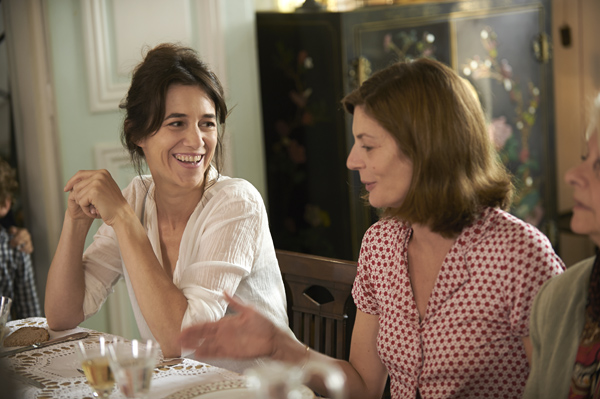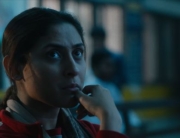Meet Marc Beaulieu, a balding, panic attack-prone tax auditor with close-set, tired eyes; a slight paunch; and the trendy stubble that gives jowly men an air of scrotal desperation. For all his unprepossessing appearance, Marc is well-meaning and possesses a hangdog charm, with which he will insinuate himself into the lives of two beautiful sisters and drive a close-knit family apart, first unwittingly and then disastrously.
Does a dull fonctionnaire wield the power to undo two striking, estimable women, especially as played by iconic French stars Charlotte Gainsbourg and Chiara Mastroianni? It’s a lot to ask the viewer to believe. Queasy farce and a sense of dread coexist awkwardly in this uneven film, which makes erratic shifts in tone until the final act explodes into full-on melodrama.
A Parisian tax collector, Marc (Benoît Poelvoorde) misses the last night train out of the provinces. At loose ends on the small town’s dark streets, he comes across a mysterious yet oddly vulnerable stranger (Charlotte Gainsbourg). The two strike up a conversation that continues all night until the sun comes up. Before parting they agree to meet in Paris in a few days. At the end of their encounter, Marc’s companion tantalizingly evades his kiss and refuses to reveal her name, a detail that will play a large part in the ruin to come.
On the big day, the disheveled small-town gamine waits for Marc by the Tuileries fountain in vain. Events conspire against Marc near the appointed hour. He is delayed first by a meeting with Chinese tax evaders, who yelp at him in broken French, a tableau played for laughs but actually laboriously unfunny. Then poor Marc crumples with an anxiety attack or perhaps a cardiac arrest. He finally arrives at the fountain to find the stranger gone. How can he explain or make amends when he doesn’t have her name or number?
Crestfallen at being stood up, the stranger returns home and resigns herself to a bitter decision: She will move to Minneapolis with a partner she no longer loves. It emerges that this restless, seemingly unmoored woman is deeply rooted in her town and family. The scene where she breaks the news of her departure to her worldly mother (Catherine Deneuve) and doting sister, Sophie (Chiara Mastroianni), is the movie’s most moving, echoing with heartbreak and unspoken fears for the future.
Back in his Paris office, Marc and Sophie meet cute. Not knowing she’s the stranger’s sister, he gallantly offers to sort out her finances. Sophie promptly falls for the auditor and dumps her husband. Lucky Marc is now set to marry the radiant, smitten Sophie and settle down in the sticks. Ah, but what will happen when Sylvie—by now we know the stranger’s name—jets to her sister’s wedding from Minneapolis?
Director Jacquot, who also made the formal, perfectionist Farewell, My Queen, demonstrates a less steady command this time around. Perverse twists of fate and technology agonizingly postpone Marc’s realization that Sophie and Sylvie are sisters. Once he figures it out, his balancing the two loves requires hernia-inducing suspensions of disbelief. Perfunctory dialogue fails to make the attraction between the characters specific or vivid. And the strain of uneven casting shows on screen. Poelvoorde fights to hold his own amongst Gainsbourg, Deneuve, and Deneuve’s real-life daughter, Chiara Mastroianni, a troika of French screen queens if there ever was one.
Not that 3 Hearts lacks pleasures or stirring moments. This handsome film richly showcases close-ups of faces battling to repress hidden emotions, knowledge, and guilt. Jolie-laide Gainsbourg, luminously shot, overlays joy and anger with a cool, defiant veneer. Mastroianni conceals distress at her new husband’s bizarre behavior behind cut-glass beauty and gravitas. And Deneuve’s sad, knowing eyes reveal that she sees trouble ahead for this family from Day One. The actresses’ strong performances struggle to elevate a story underdeveloped yet overwrought.
Gainsbourg, in particular, brings passion to her role. Dressed in men’s clothes, moving with youthful speed and verve, she creates a feral, enigmatic but touching character. At one point, Sylvie collapses in the street, begging on her knees for her partner to keep a terrible secret. It’s a raw, shocking moment in a scenario by now only marginally believable.
The heartaches occur in a burnished mise-en-scène that hearkens back to French cinema’s golden age of luxe comfort and bourgeois security. No banlieue riots or angry Algerians here. This is a world of lovingly tended gardens, impeccably lit cafes, and antique tables laden with appetizing food and wine. The film tosses in a suggestion of political conflict when Marc threatens a self-important local grandee with a tax audit, but the scenes seem to exist so that Marc has grit and backbone rather than to make any larger points about a pampered, insular milieu. Ominous one-note string stabs on the soundtrack, meant to signal tension, provide an odd counterpoint to the film’s traditional look and feel.
Emotionally unconvincing and structurally unsound, 3 Hearts demands a battle-axe critic like the pitiless Michiko Kakutani to administer a well-deserved coup de grâce. But for all its faults, moments of the film linger on in the allure of its female stars and the blunt message behind its flailing narrative. Love can be dangerous. Even wimps can wreck lives. Such facts have a crude power that the earnest, maladroit 3 Hearts cannot completely squander.







Leave A Comment